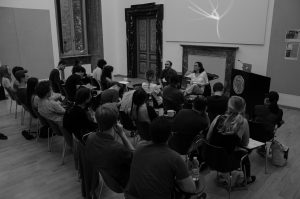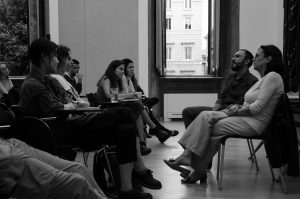
Almost exactly a week after our return back to Rome from our Southern Italy trip, we were fortunate enough to have a contemporary Italian movie screening right in the Palazzo. On October 2nd, 2017, Cornell and other students in Rome gathered to watch “Orecchie” followed by a question and answer session with the director and writer himself, Alessandro Aronadio. The film was a contemporary comedy that gave us many laughs throughout and was later very enlightening to hear about any behind the scenes details when it came to writing and directing the film.
It was interesting to watch a movie that was filmed in the same city we are studying in. Alessandro Aronadio opened up about his challenges with this because the film was a low budget production. He shared that he had to “steal Rome.” By this he meant his crew would film in locations around Rome where they weren’t necessarily allowed to or weren’t actually granted permission to do so. They would resort to filming the shot as quick as possible and then run away.
A student wondered about his writing process. Alessandro had many distinct characters in “Orecchie” with very specific personalities that it made us wonder if whether the characters were created first, and then he f

ormed a narrative around them or vice versa. Alessandro had a very creative response to this question which parallels his creative writing process. He described it as having an image in mind, and then from that image he would ask himself, why were the characters there, and what are those characters doing. From those questions to himself he would discovered the narrative.
The main theme of the film that we ended up discussing thoroughly was the idea of identity and what it means to have an identity. Alessandro pointed out that the whole movie goes on without the audience ever figuring out the main character’s name. He shares with us that it’s purposeful to symbolize that the main character is still trying to find his own identity. Discussion on the identity and the purpose of each character’s present in the film continued. In conclusion he spoke about all these characters and their interactions in a very poetic way by saying “every encounter with a person is a piece of the puzzle that makes up yourself.”
Overall, having a group discussion after a film screening can be a very productive conversation in terms of understanding the film. The Italian Cinema students that were present during this lecture are more than familiar with this discussion structure as it is often how the weekly classes are like. However, it’s different yet a great privilege to have the director and writer himself present after the film to answer any lingering questions. The students were able to learn a lot more about “Orecchie” with a primary source, Alessandro Aronadio.
